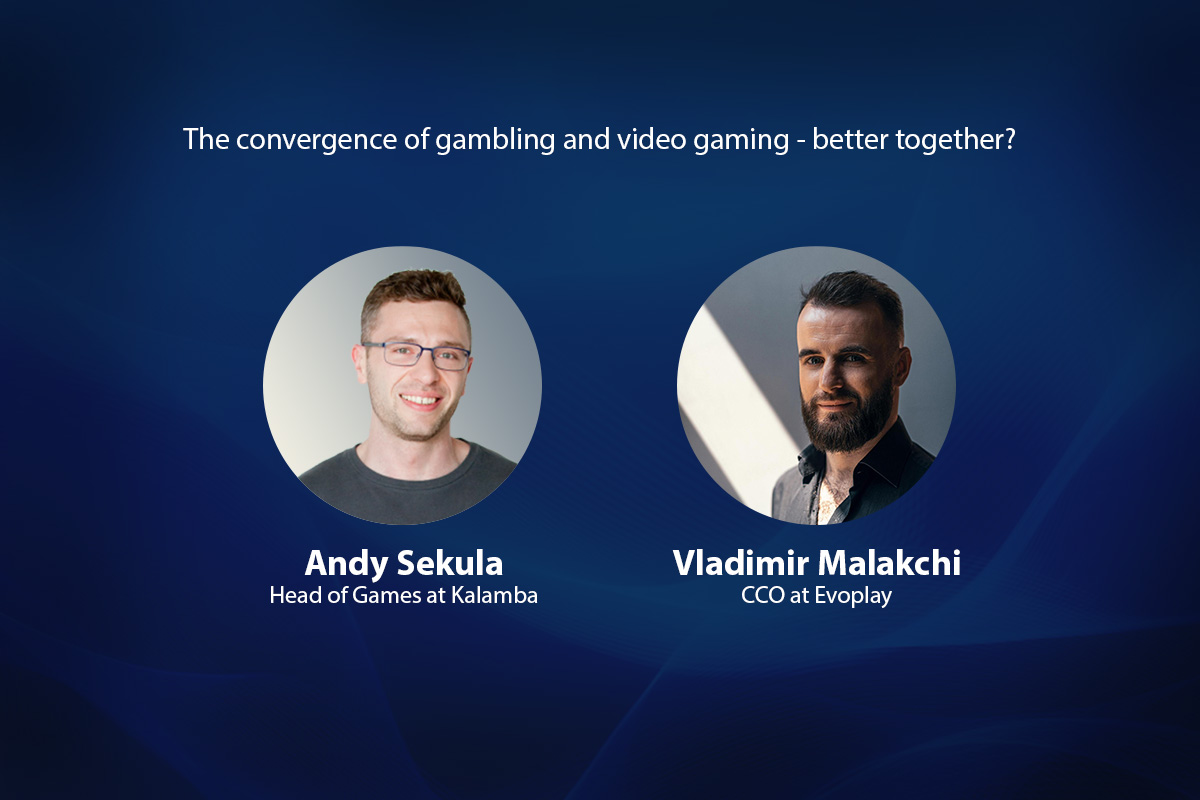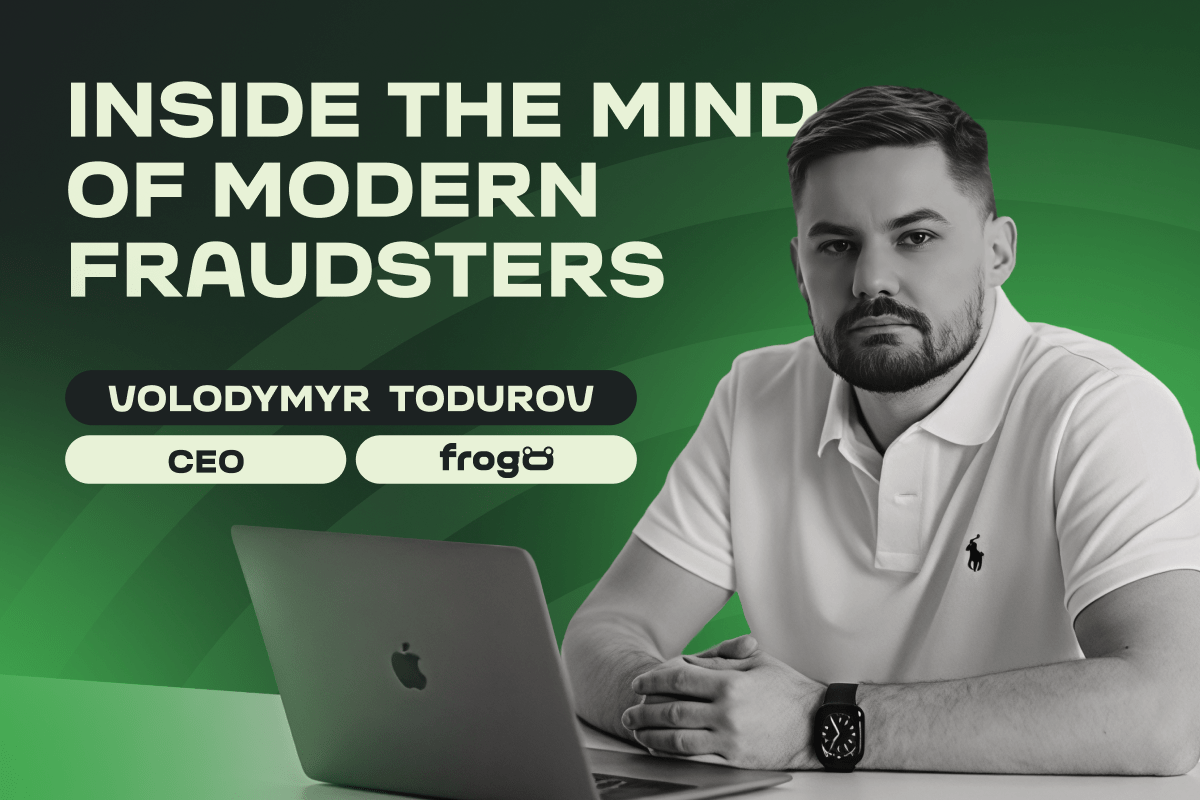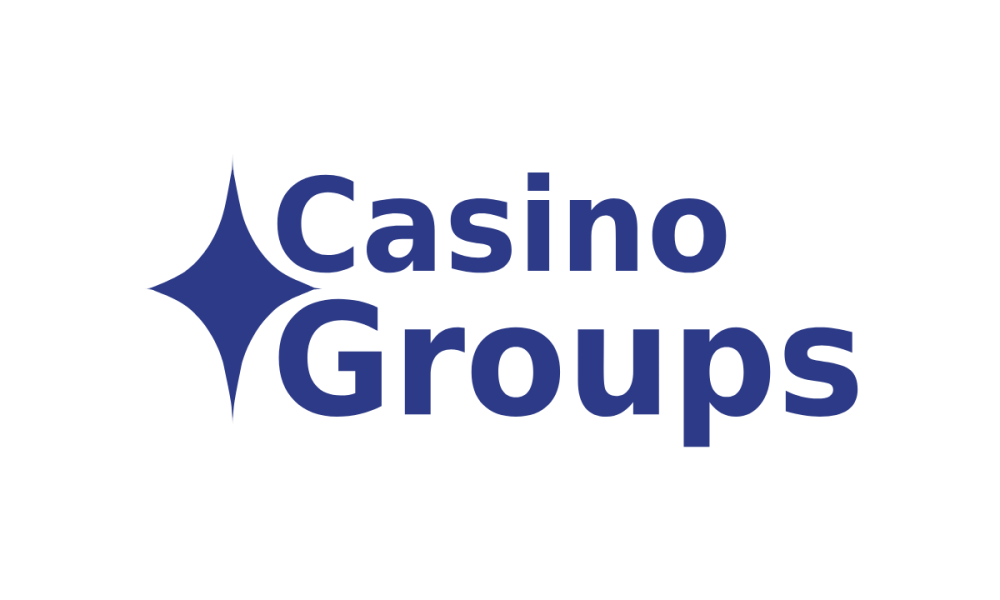Interviews
The convergence of gambling and video gaming – better together?

An increasing number of industry titans in recent years have moved into video games and many video game outfits have turned their eye to offering ‘gambling’ elements within games. With these moves and the rise of social/mobile gaming bringing these industries closer to traditional gambling and igaming, what is there to be learned from this growing convergence? Andy Sekula, Head of Games at Kalamba and Vladimir Malakchi, CCO at Evoplay offer their thoughts.
Has the global video game boom influenced the design and development of today’s games? Gamification has been a focus for iGaming developers for some time, has this been driven by the rise in video game popularity?
Andy Sekula: There has been a lot of work invested in video game development over the years in regards to all sorts of progression and collection mechanics, with the ultimate goal being to reward players for specific behaviours. The primary goal for that industry is essentially the same as ours – to entertain and engage – and to that end, we can learn from video games just as we can from other products and services that compete for leisure spend such as movie streaming platforms like Netflix.
While the nature of certain AAA video games is sometimes significantly larger in scope – think Grand Theft Auto, for example – the same principles of attracting, engaging and retaining players remains and is in a sense more difficult for iGaming studios as we have to pack the same amount of involvement into a product that is smaller in scale and by nature is shorter in terms of average playing sessions. Despite this, many slots are now a world apart from what was produced 10 or even five years ago and highlight the creative talent our industry possesses.
Vladimir Malkachi: When it comes to popular culture, the video game industry is no doubt one of the most influential verticals, especially gambling, as both gaming and gambling belong to the same concept of entertainment, where audiences from both worlds intersect with each other. After all – the convergence is obvious – both video game and casino players seek the same goals – fun and gaming. However, those who choose gambling games also want to experience the thrill of betting, which offers a whole new dimension.
From a technological point of view, iGaming companies continue to follow the video game industry and adopt their solutions, such as development, game engines, features, graphics, and sound to create an experience similar to the one seen in the video game world. Casino and video game developers also take a similar approach to storylines – they search for innovative, creative, and exciting themes that can provide a fresh and immersive experience to players. iGaming has also inherited the trend of in-game purchases, such as shops and loot boxes, a vivid example of this is the bonus buy feature you see in several casino titles these days – which again shows how much the verticals are converging.
In general, the video game industry is a trendsetter and a source of ideas and inspiration to those within the iGaming space. It attracts both Millennials and Gen Z players, who share many audiences and demographics with many gambling brands.
Licensed games, chosen correctly, can be valuable investments for studios. We have already seen classic video game IPs feature in some slot titles in the past – is this something that can be leveraged further? Must it be something more than just window dressing?
AS: This is quite a tricky thing to do well and there haven’t been too many successful examples of IPs moving from the video gaming world to slot games. Whether this relative lack of success so far is the reason why it hasn’t been leveraged more, I’m not sure.
Done right, I can see some potential in classic universal IPs like PacMan or Donkey Kong but for more modern brands such as the likes of Pokemon, you wouldn’t see it appear in slots until it’s not resonating with a younger audience anymore and when the generations that played the original game are old enough to play video slots, such as with Space Invaders or Street Fighter II.
VM: It’s always exciting when the audiences of two popular brands merge together into one type of entertainment – especially when it comes to something from the wider cultural world being integrated into iGaming.
As well as attracting wider audiences from the outside world, it certainly benefits game providers, giving them a larger media presence and in turn creating wider interest from the outside world, which is especially beneficial if you’re a listed company and as a consequence, as it can directly affect your company’s profitability and volume.
However, alongside the benefits that can be achieved by securing brand rights with third parties, we do need to take costs into account. The average royalty to be paid off to the contractor is 3-15% of the GGR, with joint approval needed from both sides, which can certainly affect the potential for a partnership, and indeed the bottom line.
Saying this though, the benefits usually outweigh the costs, and I’m sure we will see more deals of this type in the future, but considering everything mentioned above, it might not be for everyone, especially those who are just entering and establishing themselves on the market. The key, as always, is identifying your audience and followers and creating a gaming experience that resonates with their values.
Betting on people playing games (esports) has for some time proven hugely successful. What impact has this had and could have going forward, on traditional gambling as a whole?
AS: Betting on outcomes, as we’ve seen with traditional sports betting, has been around long before esports (or even electricity!) appeared, but now it’s established, esports is an ideal focus for sportsbooks since there’s a lot of both skill and luck (randomness) involved – so its a perfect vehicle for evolving the betting industry. I think given the different demographic that we see watching and being involved with esports, there’s the prospect of opening up igaming and betting industry offerings. This would mean the emergence of a whole new sector of players/bettors and consequently the potential for new styles of games/experiences to suit. It will be interesting to watch it evolve.
VM: Without a doubt, the implementation of gaming-inspired features into casino products can significantly expand what’s on offer, and as a consequence, attract new players. This is especially the case when it comes to the spirit of fixed odds and sports betting, and when incorporated into gaming titles, can help go a long way to reaching sports betting fans who might want to give gaming a try.
In our view, instant games are among the best examples of how this approach can be carried out. Players can choose types of bets, which provides them with a gambling experience similar to betting on sports, which in turn makes them feel right at home without any major learning curve required to start playing a game.
The value of such products was analysed heavily during 2020 when sports events were canceled, and bettors needed to find a substitution for the hobby they used to entertain themselves with. Subsequently the adoption of betting mechanics in casino games’ introduced casino brands to the sports betting market and simultaneously covered its audience’s demand – we’ve seen the success it has had during the last two years, and there’s no reason for that not to continue even with sports back, as we are entering a new era of gaming where such transitions are far easier than before.
A recent study declared that video gamers are up to 4.5 times more likely to participate in betting and igaming. How can this new demographic of potential players be best approached?
AS: To some extent, this could be two things: being literate with technology and already being introduced to the concept of gambling (like gatcha boxes) and competition (leaderboards) that they have already been exposed to and are experienced in. Or maybe it’s more about the preference for electronic entertainment (deemed the ‘spiritual opium’ by Beijing regulators). Either way, it’s another sector of players for us to understand and to do our best to accommodate.
VM: As we’ve mentioned, there’s plenty of intersection when it comes to audiences and demographics, as at the end of the day, all users are after one thing – entertainment. This means that everything starts with a product that can both encompass and be adapted to players’ usual patterns of expectations for the gaming experience. It is evident that both video gamers and sports betting fans have their own preference – gamers especially look for a storyline, strong characters, and a clearly-defined challenge – while sports bettors will always gravitate towards ‘live events’ and the thrill of taking on the ‘house’.
In line with this – when robust analytics of audiences and demographics are applied, companies can learn where users can be found and the methods behind attracting them through specific messaging and themes. This requires analytics-based marketing, as well as creative and technological solutions, which will of course vary across product type and the desired outcome.
Online, social gaming is a place where many gamers meet up, forge friendships and communities – to what extent can this be mirrored within igaming?
AS: Basically, a brick and mortar casino creates an environment where players can gamble in a social setting, which additionally reinforces many emotions. This can be, to some extent, recreated within the live casino vertical, where people chat and bet on the outcomes of the casino games and their variations in real-time. We can also see some efforts being made in order to make slot games more of a social experience, where people can not only watch and chat with the streamer but can also bet with them. There’s great potential for experiences like this to be developed.
VM: Socialisation is an established concept in the video game industry, where multiplayer gaming has almost become a must-have offering and certainly has become an event that players expect when certain games are released. A wide variety of platforms designed for communication between players is key to making this happen – with forums, chats, and online communities allowing gamers to interact with each other.
Steam set the trend for socialisation in the gaming vertical, providing an opportunity for players to discuss games, share their opinions and give recommendations. Twitch has continued this trend, as well as attracting gambling streamers, once again demonstrating how the two audiences often intersect. The content on Twitch attracted fans of casino games, which gave rise to the communication between gamblers.
Today, the social aspect of gambling continues to grow, which will no doubt continue to see growth continue given the demand. The pandemic and insufficient levels of communication due to lockdowns have only enhanced the demand for socialisation within iGaming, as it’s become quite apparent that modern players seek to exchange their playing experience.
Powered by WPeMatico
Interviews
Portrait of a Fraudster Then and Now: How Scammers’ Habits and Tactics Are Changing

Fraud in the iGaming sector is no longer the work of lone opportunists. Today’s scammers operate in well-organized, tech-savvy networks – quietly exploiting systems that weren’t built to catch them. And as the digital economy grows, so too does the complexity of fraud schemes targeting gaming operators.
Amid this evolving threat landscape, Frogo has emerged as a company redefining how fraud prevention should work. We spoke with Volodymyr Todurov, CEO at Frogo, to get an inside look at how fraudsters are changing their tactics – and what operators can do to stay ahead.
Fraudsters evolve fast – how does your system stay one step ahead without overwhelming teams with false alarms?
Absolutely, the landscape of fraud is constantly shifting and staying ahead requires more than static rules. At Frogo, we’ve developed a dynamic system that adapts in real-time to user behavior and transaction contexts. Our platform learns from both fraudulent and legitimate activities, enabling it to distinguish between the two more effectively. This approach reduces false positives and ensures that our clients’ teams can focus on genuine threats without being bogged down by unnecessary alerts.
Can you walk us through a real-world case where your platform uncovered a fraud scheme traditional tools missed?
Absolutely. One notable case involved a large-scale bot attack targeting SMS-based fraud vectors. Initially, our standard device ID-based defenses helped neutralize the first wave of the attack. However, the adversaries quickly adapted, altering their emulation tactics to bypass traditional checks. At that point, conventional methods were no longer sufficient to detect the evolving fraud.
We responded by implementing a dynamic anomaly detection framework. This involved redefining detection signals in real-time using IP intelligence and deep device fingerprint attributes – areas where our proprietary data collection algorithms provided a significant edge. By anchoring detection logic to more granular and resilient signals, we were able to recalibrate thresholds dynamically, ensuring legitimate users weren’t impacted.
The results were decisive: bot attack efficiency dropped sharply from over 80% to just 3.5%.
What’s something about fraud detection that most businesses get wrong? And how does Frogo challenge that?
A common pitfall we see is operational rigidity – many businesses rely on static rules and general-purpose triggers that result in high false positive rates. This not only burdens anti-fraud teams with unnecessary manual reviews but also degrades the experience for legitimate users, especially loyal or VIP customers.
For example, it’s typical to see blanket rules like “manually verify all payouts over X euros.” While that may seem prudent, in reality it’s inefficient. It overlooks low-value, high-frequency fraud – such as bonus abuse – and disproportionately flags legitimate high-value players.
At Frogo, we take a different approach. Our system adapts rules dynamically based on customer behavior and segmentation. A trusted VIP user with a long-standing reputation shouldn’t be reviewed multiple times a day. But if a wave of new €5 accounts starts exhibiting bonus-hunting behavior, they should run immediate scrutiny – regardless of transaction size.
By aligning detection logic with behavioral context and player reputation, we reduce noise, increase fraud catch rates, and protect real users from unnecessary friction.
How does Frogo automate risk logic without sacrificing the flexibility businesses need to reflect their unique policies and traffic patterns?
At Frogo, we don’t see automation and customization as opposing forces – they operate in different dimensions. Our focus is on automating the customization of risk and scoring policies in a way that respects each client’s specific risk appetite and user behavior.
We achieve this through dynamic triggers. Rather than hardcoding arbitrary rules – like “five failed top-ups per minute equals fraud” – we apply adaptive scoring thresholds that align with real-world usage patterns.. For example, our system might detect that, for a certain payment method and user segment, more than 1.3 failed top-ups per minute is statistically anomalous – because it exceeds the 98th percentile of historical behavior.
But that same trigger adjusts automatically. If the next day a payment provider experiences a technical issue and normal users start retrying more often, the threshold might shift to 2.7. What was anomalous yesterday may no longer be today – and our system adapts accordingly to reflect evolving traffic patterns.
As a result: the clients retain full control over their risk strategy, while Frogo ensures their policies scale efficiently, adapt in real time, and minimize false positives – even in volatile traffic conditions.
Beyond detection – how does Frogo help companies investigate and understand fraud at a strategic level?
Detection is just the beginning. Frogo’s graph-based forensic tools and AI models provide a comprehensive view of the relationships between accounts, transactions and behaviors. This allows companies to identify patterns and vulnerabilities that might not be apparent through traditional analysis. Our analytics layer offers insights into trends and forecasts, enabling businesses to understand the broader context of fraudulent activities and make informed strategic decisions to mitigate future risks.
Fraud might be getting smarter, but so are the solutions built to fight it. Platforms like Frogo are helping operators move beyond reactive security measures and into a space of strategic, data-informed defense. In an industry where trust is everything, that shift might just be the difference between staying one step ahead – or falling behind.
Disclaimer: Frogo’s fraud prevention solutions are developed in full compliance with applicable data protection laws, including GDPR. All behavioural analysis is performed on anonymised or aggregated data, with full transparency and control provided to our clients.
The post Portrait of a Fraudster Then and Now: How Scammers’ Habits and Tactics Are Changing appeared first on European Gaming Industry News.
Interviews
Inside the Matrix: A Conversation with EveryMatrix Founders on Europe, Expansion, and Staying Hands-On

By Maria Emma Arnidou, Event Marketing Director at HIPTHER, for the European Gaming Media
During the recent EveryMatrix Media Day at the company’s opening of their new London office, Co-Founders Ebbe Groes (CEO) and Stian Hornsletten sat down with press to share key insights into their strategic vision. In this exclusive Q&A, we explore their views on the European Market, the evolution of EveryMatrix’s business model, leadership philosophy, and the company’s experience in the ever-evolving U.S. market.
Europe is filled with local heroes. It’s far more fragmented than most people think.
You discussed emerging markets in your presentation. What about Europe – is it considered saturated, or are there still areas of growth?
Ebbe Groes: I really don’t think Europe is saturated at all. In fact, big parts of it are still underdeveloped. Take France for example, it doesn’t allow online casino. Germany has effectively banned it. That’s two of Europe’s three largest economies where casino is either outlawed or nearly impossible. So yes, there is still plenty of room for growth.
Stian Hornsletten: And the market is getting more concentrated around a few bigger players, but even then, it’s not as centralized as in the U.S.
Ebbe Groes: Exactly. Europe is filled with local heroes. You won’t find many players dominating across the board. Kindred, Betsson – they’re strong, but when you go country by country and look at market share, the picture is very fragmented. Even with the economies of scale in marketing – say you sponsor a Premier League team – you’re still not getting the full return unless you’re present across multiple markets. That’s what makes Europe so different from the U.S., where a few big players hold all the cards.
We started with a sportsbook. Now we’re building an ecosystem.
EveryMatrix today operates across multiple verticals with a deeply diversified portfolio. Was this the vision from the start, or did it evolve as the company grew?
Stian Hornsletten: The vision definitely evolved quickly as we grew. We started with OddsMatrix, a B2B sportsbook product that was meant to be an off-the-shelf, managed solution – something that didn’t exist back then. Within a year, we had already expanded into turnkey and PAM solutions. By 2010–2011, we had launched the CasinoEngine and started specializing in product verticals.
We’ve always been very innovation-driven. We keep developing new products – some of which are still under wraps – and R&D remains one of the most exciting parts of what we do. Today, most of our top 10 clients are turnkey. While we still offer standalone modules, our growth has come from cross-vertical synergy.
Despite this scale and complexity, you both remain deeply involved in the company’s day-to-day operations. How do you manage to stay on top of everything across products, people, and processes?
Ebbe Groes: It helps that we’ve been here from the start. I wouldn’t want to be hired into this role now and try to learn everything from scratch – but I’ve had 18 years to absorb it all. We’ve built the company in a way that each vertical operates almost like its own business. For example, the sports division has its own CTO, product team, trading team, and even its own support function. That independence gives us breathing room.
It allows me to focus on high-level strategy, like acquisitions – take FSB, for instance. That required a lot of focus at the start, but eventually it will transition into the core business and require less direct involvement.
Stian Hornsletten: Over the years, we’ve also developed strong planning, reporting, and KPI structures across the business. That consistency makes it easier to monitor everything and integrate new divisions. Whether we open a new office or onboard a new team, we already have the systems in place to support them.
Ebbe Groes: And the same goes for finance and HR. When we opened the London office, the HR team already knew how to handle it – we’d opened three the year before. That kind of maturity allows us to move fast without creating chaos.
“In Europe we have 150 competitors in content; in the U.S., maybe 10.”
And what about the U.S. – a market many see as the holy grail of iGaming? What’s your current position there?
Ebbe Groes: To be honest, the U.S. was a tough lesson. We entered hoping to provide a full turnkey solution, but the market didn’t evolve the way we expected. Many well-funded B2C operators pulled out, and that left little demand for companies like us to offer the full stack. We pivoted to focus on one thing: our own gaming content.
Stian Hornsletten: We’re now live in four out of five regulated U.S. states for our own content, and we have agreements with all the major operators. Some new games from SlotMatrix are set to launch by summer, and they’ve already shown strong performance elsewhere – which gives us hope. If we manage to capture even 1–2% market share with our own content, that would already be meaningful.
But it’s been a long and costly process. Every state has its own regulatory requirements, separate hosting, and certification needs. And if one state’s not ready, operators won’t promote your games nationally. It’s frustrating, but it also reduces competition. In Europe we have 150 competitors in content; in the U.S., maybe 10. So if we can endure, there’s long-term potential.
The post Inside the Matrix: A Conversation with EveryMatrix Founders on Europe, Expansion, and Staying Hands-On appeared first on European Gaming Industry News.
casino
Review Fatigue Is Real: How to Make Casino Comparisons Clear, Honest, and Huma

Sebastian Jarosch is the founder of Mithrillium Media Ltd, and a very famous figure in the iGaming industry. His contributions to the market have been immensely influential. Jarosch has overlooked several projects relating to the online gambling market, most notably those involving affiliates. Because of his past works, we believe he is uniquely qualified to address the topic of Review Fatigue, that seem to be plaguing the industry right now.
Actions speak louder than words. And Jarosch’s actions have earned him several of the most notable industry awards. Among the most notable are the Casinomeister 2020 Awards for Best Casino Group, the AskGamblers Awards for Best Partner in 2021, and the Affpapa Awards Affiliate Programme of the Year 2022.
Interview Questions:
What is “review fatigue,” and why do you think it’s becoming a growing issue in the iGaming space?
Review fatigue happens when players are faced with repetitive, overly long, or generic content. With so many casinos offering similar bonuses, games, and licensing, users quickly lose interest if every review sounds the same. Many reviews lack real insight and simply list features without context, often sounding too good to be true. As a result, players tend to skim or move on entirely, especially if they’ve already seen the same structure and wording on multiple other sites.
How can overly technical or overly promotional content alienate users instead of helping them?
When content is too technical, it can confuse or intimidate newcomers. Ideally content is educational and written with the player in mind. On the flip side, a sales pitch feels dishonest, especially to experienced players who know what to look for. Users are looking for clarity and guidance, not marketing sugar coated casinos. If a review sounds like it’s trying to sell rather than help, it erodes trust immediately. Players want transparency, real pros and cons, not just buzzwords.
What are the most important things players want to see in a casino comparison, and what can we safely leave out?
Players want to know the promotions, payment methods, withdrawal speeds, licensing, game variety, and reliability of a casino. They also care about things like support quality, KYC, ownership, RTPs, and real player feedback. What they don’t want is generic content that could apply to any casino and offers no real value. Sites like Casino-Groups help players pick the right casinos based on individual preferences.
How do you balance clarity with completeness when writing or designing reviews?
It’s all about prioritizing information and guiding the reader. We aim to answer the most important user questions right at the beginning, often using summary tables to make things easier to digest. More detailed information comes later for those who want to dive deeper. It’s important to avoid walls of text and explain complex terms in plain language. The goal is to give users exactly what they need to know, without bombarding them with unnecessary information.
Do players trust shorter, more digestible content more than long-form reviews today? Why or why not
Shorter content tends to convert better because users find what they’re looking for quickly, without digging through long paragraphs full of filler. Dense, meaningful content with no waste often performs best. A short, clear, and well-structured review can build more trust than a long one filled with fluff. That said, some players do enjoy longer reviews, especially when they’re broken up with visuals, clear sections, and genuinely useful insights.
What role does tone of voice play in making reviews feel more human and less “salesy”?
A review should feel like it’s written by a real person who’s an expert in the field, not by ChatGPT or a salesperson. We use conversational language where possible and speak directly to the user. If something’s bad or a bonus is just average, it needs to be mentioned. That kind of honesty builds far more credibility than flashy design or empty buzzwords.
How do you verify and present information (e.g., licensing, terms, payment speed) in a way that’s both accurate and user-friendly?
We manually verify everything by signing up, testing support, and reading the fine print. We also check licenses through official registries and monitor user feedback on watchdog sites. To present the information clearly, we use tables, lists, screenshots, and both internal and external links to relevant pages. All our reviews follow a consistent format so players know what to expect and can easily find the details they need.
Have you experimented with visual elements like comparison tables, badges, or rating meters to reduce cognitive load?
Pictures speak a thousand words and help break up content into smaller, more digestible sections, reducing review fatigue. We use comparison tables for things like bonus terms, game selection, and payment methods. Every review includes a rating, and we apply badges to highlight our top casinos. This makes it easier for users to compare options at a glance and make smarter decisions with less effort.
What strategies do you use to keep review formats consistent while still personalizing the experience for different user types?
We follow a consistent structure that works well for both SEO and conversions. However, if a specific area needs emphasis or additional context, we’re happy to deviate from our standard format to ensure topical completeness. Some casinos offer unique features that deserve extra attention, and in those cases, we’ll add dedicated sections. The framework is consistent, but we stay flexible where it counts.
Looking ahead, how do you think casino reviews will evolve to meet changing user expectations and attention spans?
We’ll see more interactivity, personalization, and smarter use of data. Reviews could adapt in real time based on user preferences, highlighting crypto options for one user and game selection for another. AI chatbots may help users find the best match and answer questions about a casino instantly. Integration with platforms like Discord or Telegram where players can exchange themselves could also make reviews feel more social and trustworthy. Reviews need to become sharper, more authentic, and more genuinely helpful than ever before.
The post Review Fatigue Is Real: How to Make Casino Comparisons Clear, Honest, and Huma appeared first on Gaming and Gambling Industry in the Americas.
-

 Australia7 days ago
Australia7 days agoVGCCC: Minors Exposed to Gambling at ALH Venues
-

 Africa7 days ago
Africa7 days agoSA Rugby Renews its Partnership with Betway
-

 Central Europe5 days ago
Central Europe5 days agoGerman Federal Government Significantly Increases the Budget for Games Funding
-

 Croc’s Lock7 days ago
Croc’s Lock7 days agoFBM® unveils golden treasures in Mexico with Croc’s Lock™ bites
-

 Eastern Europe6 days ago
Eastern Europe6 days agoThunderkick enhances presence in Romania through MaxBet partnership
-

 BETBY6 days ago
BETBY6 days agoBETBY EXPANDS LATAM FOOTPRINT WITH MOBADOO ESPORTS PARTNERSHIP
-

 Compliance Updates7 days ago
Compliance Updates7 days agoHonolulu Mayor Signs New Laws Targeting Illegal Game Rooms
-

 Africa6 days ago
Africa6 days agoBetKing Delivers Healthcare Services and Nutrition Support to Underserved Nigerian Communities




















